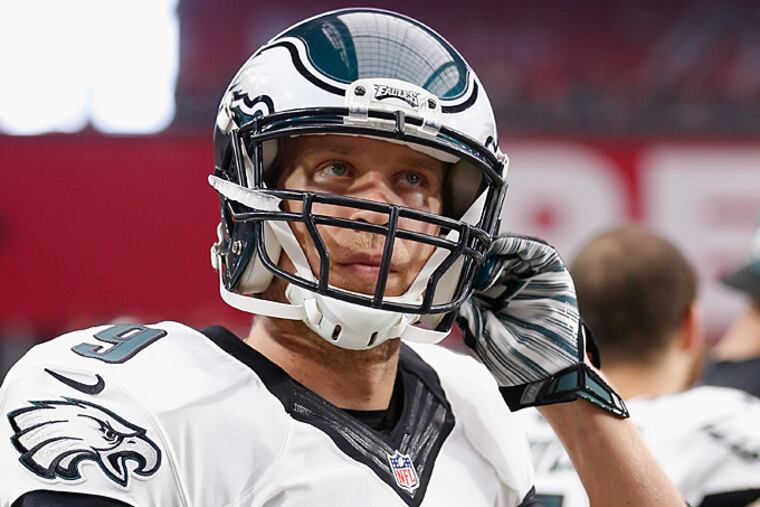Eagles' Foles working to fix backpedaling problem
The process for fixing what ails Nick Foles - the habit of backpedaling in the pocket and throwing off his back foot - is relatively simple, according to Chip Kelly.

The process for fixing what ails Nick Foles - the habit of backpedaling in the pocket and throwing off his back foot - is relatively simple, according to Chip Kelly.
"The learning process for anybody is, 'I hear and I forget. I see and I remember. I do and I understand,' " the Eagles coach said last week.
So the procedure involves showing Foles on film what he did wrong and then taking the lesson to the practice field and working on pocket awareness and the mechanics of throwing.
It is especially difficult to make fundamental corrections during a game. Quarterbacks coach Bill Musgrave can show Foles a snapshot on the sideline and point out what he might have done wrong, but often it takes sitting in a room and watching the actual film for full comprehension.
"You can show it to him on [the sideline] and say, 'Hey, this is happening.' [Then they say], 'I didn't think it was happening. It didn't feel like that to me,' " Kelly said. "Then you show it to him on tape [and he says], 'Geez, I didn't know it actually transpired that way.' "
On several plays against the Cardinals last week it was clear Foles was unnecessarily backpedaling. There was no pressure, he had a pocket, but he felt something or imagined something and dropped farther. Often, he wound up throwing off his back foot.
"I want it to be fixed. . . . I have to keep studying film and making sure [of] the fundamental things," Foles said. "I see a couple of plays where I've got to make sure my body is in the right position."
As simple as Kelly's steps are, it's impossible to simulate a pass rush in practice. Quarterbacks are off-limits for contact, the pass rush is imaginary, and the speed is less than maximum. There aren't many opportunities to fail.
Most pocket movement simulation can be created only during team drills. The Eagles do create scenarios during individual position drills, but they often involve a coach or player running at the quarterback as he practices his footwork.
"You try to . . . put him in those situations where he can get a feel for how the pocket is coming in on him, where we are, his ability to step up in the pocket and throw the ball on time," Kelly said.
As much as the Eagles can show Foles where he went wrong and have him practice the proper technique on deep drops and pocket awareness, knowing when to step up (as often as possible) and not backpedal (as little as possible) is often instinctive.
"A lot of it is instinctive," Eagles backup quarterback Mark Sanchez said. "But you should set deep 91/2 [yards] and let the pass rush come around outside and then step up in the pocket. The best plays happen when you're moving forward. When you start to moving laterally you get parallel to the line of scrimmage with your shoulders, and it just goes to crap - usually."
"That's why your center and guards have to get good push. Let [the rushers] run around the dish and then you step up. That's really your pocket. It's kind of a 'U.' "
Various theories have arisen for why Foles has been reluctant to step up in the pocket. He took several early-season hits from up the middle when starting center Jason Kelce and left guard Evan Mathis were out with injuries. Replacement center David Molk and left guard Matt Tobin have been increasingly reliable in pass protection, though.
"If you can stay in the pocket, trust the pocket, there's no reason to flush," offensive coordinator Pat Shurmur said. "Go through your progression, as the down gets late then you start to use your feet and do the right thing with the football."
There have been plenty of examples of Foles' properly going through Shurmur's steps. In the Arizona game, the pocket collapsed, he rolled to the right, and hit Riley Cooper with a 50-yard pass.
But on other occasions Foles hasn't carried out the last part of the equation and has made the wrong decision, resulting in an interception or incompletion. The Eagles have seen a little more zone defense this season as opposed to last year, according to Kelly, but Foles said that hasn't been the problem.
"It just has to do with decision-making," he said. "I think a couple times I forced a couple throws. . . . Last year, I did a good job of just pulling it back."
The biggest recent concern, however, one both Kelly and Shurmur have acknowledged, has been Foles' reluctance to step up against a phantom rush. The return of Kelce against the Texans on Sunday could help, although right guard Todd Herremans is expected to play with a torn biceps and will likely have to contend with all-world defensive end J.J. Watt.
Foles knows the task at hand and knows what needs to be done after a week of seeing and doing. But he also doesn't want to overthink what is, as Sanchez said, instinctive.
"Even though I do move in the pocket, I just need to make sure I hit that back foot and get my weight going forward," Foles said. "Sometimes I am going sideways and throwing balls where my feet aren't going forward. But I've made a lot of throws where my feet aren't going in that direction, too.
"So I just can't forget about that altogether and become a robot."